Practice Based Public Health and Health Promotion Project: Dementia
VerifiedAdded on 2023/02/01
|24
|8401
|78
Project
AI Summary
This project focuses on addressing health inequalities in dementia care within the Westminster borough of London, UK. It begins with an introduction that defines dementia, highlights its impact, and sets the aim to analyze health and social inequalities in dementia care services while developing an intervention plan for treatment and prevention. The project identifies the needs of the target group, including the elderly population, caregivers, and healthcare providers, emphasizing the importance of early diagnosis, care services, and community engagement. It analyzes the epidemiology of dementia in Westminster, highlighting the increasing number of elderly people at risk. The project then moves on to evidence, including local services, strategies, and the measurement of health interventions. The intervention plan includes data collection methods, resource analysis, a timeline, and ethical considerations. The project concludes with recommendations to improve dementia care, address health inequalities, and enhance the quality of life for patients and their families. The project underscores the need for integrated care facilities, psychological therapies, and community services to meet the diverse needs of dementia patients.

Practice Based Public Health
and Health Promotion Project
and Health Promotion Project
Paraphrase This Document
Need a fresh take? Get an instant paraphrase of this document with our AI Paraphraser
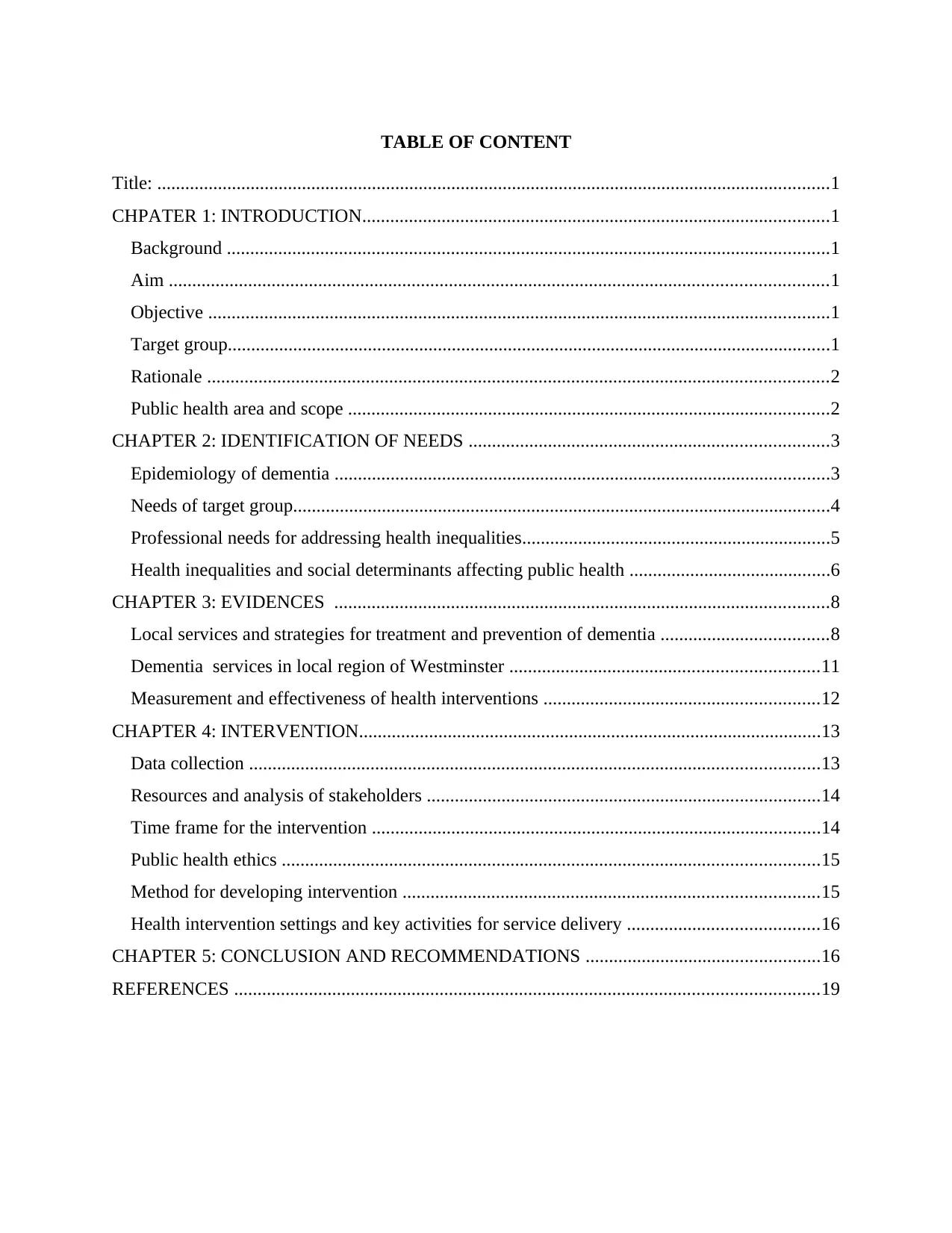
TABLE OF CONTENT
Title: ................................................................................................................................................1
CHPATER 1: INTRODUCTION....................................................................................................1
Background .................................................................................................................................1
Aim .............................................................................................................................................1
Objective .....................................................................................................................................1
Target group.................................................................................................................................1
Rationale .....................................................................................................................................2
Public health area and scope .......................................................................................................2
CHAPTER 2: IDENTIFICATION OF NEEDS .............................................................................3
Epidemiology of dementia ..........................................................................................................3
Needs of target group...................................................................................................................4
Professional needs for addressing health inequalities..................................................................5
Health inequalities and social determinants affecting public health ...........................................6
CHAPTER 3: EVIDENCES ..........................................................................................................8
Local services and strategies for treatment and prevention of dementia ....................................8
Dementia services in local region of Westminster ..................................................................11
Measurement and effectiveness of health interventions ...........................................................12
CHAPTER 4: INTERVENTION...................................................................................................13
Data collection ..........................................................................................................................13
Resources and analysis of stakeholders ....................................................................................14
Time frame for the intervention ................................................................................................14
Public health ethics ...................................................................................................................15
Method for developing intervention .........................................................................................15
Health intervention settings and key activities for service delivery .........................................16
CHAPTER 5: CONCLUSION AND RECOMMENDATIONS ..................................................16
REFERENCES .............................................................................................................................19
Title: ................................................................................................................................................1
CHPATER 1: INTRODUCTION....................................................................................................1
Background .................................................................................................................................1
Aim .............................................................................................................................................1
Objective .....................................................................................................................................1
Target group.................................................................................................................................1
Rationale .....................................................................................................................................2
Public health area and scope .......................................................................................................2
CHAPTER 2: IDENTIFICATION OF NEEDS .............................................................................3
Epidemiology of dementia ..........................................................................................................3
Needs of target group...................................................................................................................4
Professional needs for addressing health inequalities..................................................................5
Health inequalities and social determinants affecting public health ...........................................6
CHAPTER 3: EVIDENCES ..........................................................................................................8
Local services and strategies for treatment and prevention of dementia ....................................8
Dementia services in local region of Westminster ..................................................................11
Measurement and effectiveness of health interventions ...........................................................12
CHAPTER 4: INTERVENTION...................................................................................................13
Data collection ..........................................................................................................................13
Resources and analysis of stakeholders ....................................................................................14
Time frame for the intervention ................................................................................................14
Public health ethics ...................................................................................................................15
Method for developing intervention .........................................................................................15
Health intervention settings and key activities for service delivery .........................................16
CHAPTER 5: CONCLUSION AND RECOMMENDATIONS ..................................................16
REFERENCES .............................................................................................................................19
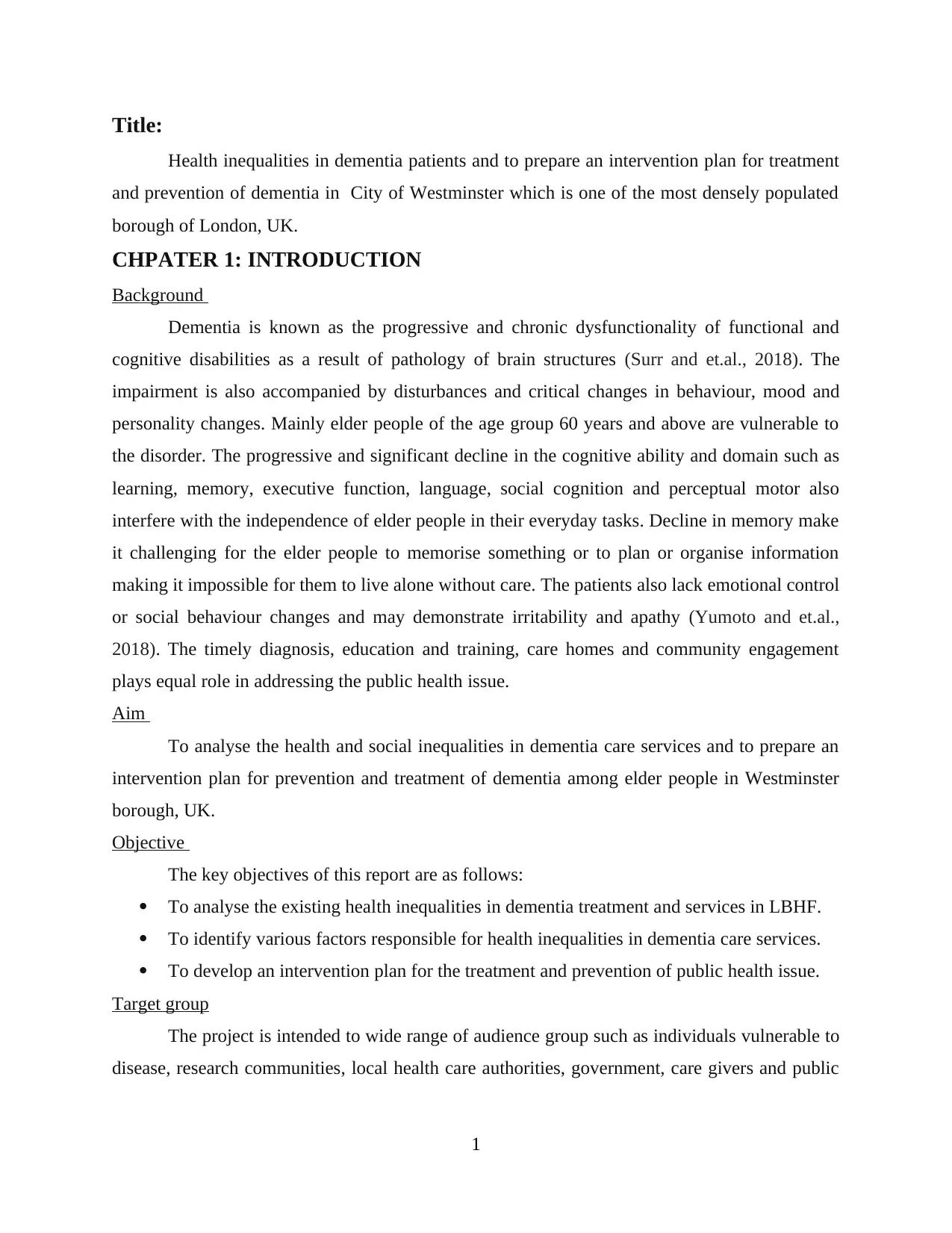
Title:
Health inequalities in dementia patients and to prepare an intervention plan for treatment
and prevention of dementia in City of Westminster which is one of the most densely populated
borough of London, UK.
CHPATER 1: INTRODUCTION
Background
Dementia is known as the progressive and chronic dysfunctionality of functional and
cognitive disabilities as a result of pathology of brain structures (Surr and et.al., 2018). The
impairment is also accompanied by disturbances and critical changes in behaviour, mood and
personality changes. Mainly elder people of the age group 60 years and above are vulnerable to
the disorder. The progressive and significant decline in the cognitive ability and domain such as
learning, memory, executive function, language, social cognition and perceptual motor also
interfere with the independence of elder people in their everyday tasks. Decline in memory make
it challenging for the elder people to memorise something or to plan or organise information
making it impossible for them to live alone without care. The patients also lack emotional control
or social behaviour changes and may demonstrate irritability and apathy (Yumoto and et.al.,
2018). The timely diagnosis, education and training, care homes and community engagement
plays equal role in addressing the public health issue.
Aim
To analyse the health and social inequalities in dementia care services and to prepare an
intervention plan for prevention and treatment of dementia among elder people in Westminster
borough, UK.
Objective
The key objectives of this report are as follows:
To analyse the existing health inequalities in dementia treatment and services in LBHF.
To identify various factors responsible for health inequalities in dementia care services.
To develop an intervention plan for the treatment and prevention of public health issue.
Target group
The project is intended to wide range of audience group such as individuals vulnerable to
disease, research communities, local health care authorities, government, care givers and public
1
Health inequalities in dementia patients and to prepare an intervention plan for treatment
and prevention of dementia in City of Westminster which is one of the most densely populated
borough of London, UK.
CHPATER 1: INTRODUCTION
Background
Dementia is known as the progressive and chronic dysfunctionality of functional and
cognitive disabilities as a result of pathology of brain structures (Surr and et.al., 2018). The
impairment is also accompanied by disturbances and critical changes in behaviour, mood and
personality changes. Mainly elder people of the age group 60 years and above are vulnerable to
the disorder. The progressive and significant decline in the cognitive ability and domain such as
learning, memory, executive function, language, social cognition and perceptual motor also
interfere with the independence of elder people in their everyday tasks. Decline in memory make
it challenging for the elder people to memorise something or to plan or organise information
making it impossible for them to live alone without care. The patients also lack emotional control
or social behaviour changes and may demonstrate irritability and apathy (Yumoto and et.al.,
2018). The timely diagnosis, education and training, care homes and community engagement
plays equal role in addressing the public health issue.
Aim
To analyse the health and social inequalities in dementia care services and to prepare an
intervention plan for prevention and treatment of dementia among elder people in Westminster
borough, UK.
Objective
The key objectives of this report are as follows:
To analyse the existing health inequalities in dementia treatment and services in LBHF.
To identify various factors responsible for health inequalities in dementia care services.
To develop an intervention plan for the treatment and prevention of public health issue.
Target group
The project is intended to wide range of audience group such as individuals vulnerable to
disease, research communities, local health care authorities, government, care givers and public
1
⊘ This is a preview!⊘
Do you want full access?
Subscribe today to unlock all pages.

Trusted by 1+ million students worldwide
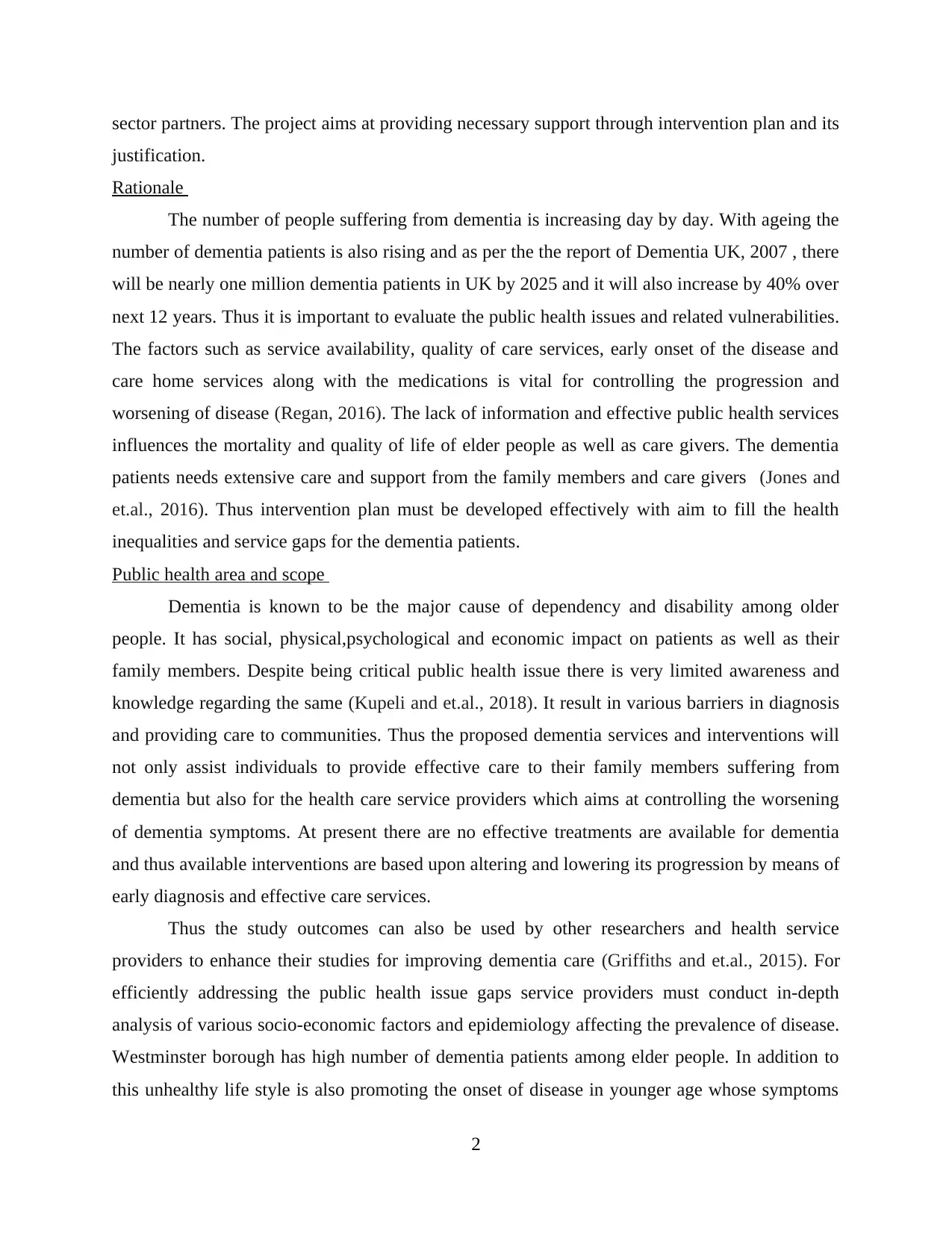
sector partners. The project aims at providing necessary support through intervention plan and its
justification.
Rationale
The number of people suffering from dementia is increasing day by day. With ageing the
number of dementia patients is also rising and as per the the report of Dementia UK, 2007 , there
will be nearly one million dementia patients in UK by 2025 and it will also increase by 40% over
next 12 years. Thus it is important to evaluate the public health issues and related vulnerabilities.
The factors such as service availability, quality of care services, early onset of the disease and
care home services along with the medications is vital for controlling the progression and
worsening of disease (Regan, 2016). The lack of information and effective public health services
influences the mortality and quality of life of elder people as well as care givers. The dementia
patients needs extensive care and support from the family members and care givers (Jones and
et.al., 2016). Thus intervention plan must be developed effectively with aim to fill the health
inequalities and service gaps for the dementia patients.
Public health area and scope
Dementia is known to be the major cause of dependency and disability among older
people. It has social, physical,psychological and economic impact on patients as well as their
family members. Despite being critical public health issue there is very limited awareness and
knowledge regarding the same (Kupeli and et.al., 2018). It result in various barriers in diagnosis
and providing care to communities. Thus the proposed dementia services and interventions will
not only assist individuals to provide effective care to their family members suffering from
dementia but also for the health care service providers which aims at controlling the worsening
of dementia symptoms. At present there are no effective treatments are available for dementia
and thus available interventions are based upon altering and lowering its progression by means of
early diagnosis and effective care services.
Thus the study outcomes can also be used by other researchers and health service
providers to enhance their studies for improving dementia care (Griffiths and et.al., 2015). For
efficiently addressing the public health issue gaps service providers must conduct in-depth
analysis of various socio-economic factors and epidemiology affecting the prevalence of disease.
Westminster borough has high number of dementia patients among elder people. In addition to
this unhealthy life style is also promoting the onset of disease in younger age whose symptoms
2
justification.
Rationale
The number of people suffering from dementia is increasing day by day. With ageing the
number of dementia patients is also rising and as per the the report of Dementia UK, 2007 , there
will be nearly one million dementia patients in UK by 2025 and it will also increase by 40% over
next 12 years. Thus it is important to evaluate the public health issues and related vulnerabilities.
The factors such as service availability, quality of care services, early onset of the disease and
care home services along with the medications is vital for controlling the progression and
worsening of disease (Regan, 2016). The lack of information and effective public health services
influences the mortality and quality of life of elder people as well as care givers. The dementia
patients needs extensive care and support from the family members and care givers (Jones and
et.al., 2016). Thus intervention plan must be developed effectively with aim to fill the health
inequalities and service gaps for the dementia patients.
Public health area and scope
Dementia is known to be the major cause of dependency and disability among older
people. It has social, physical,psychological and economic impact on patients as well as their
family members. Despite being critical public health issue there is very limited awareness and
knowledge regarding the same (Kupeli and et.al., 2018). It result in various barriers in diagnosis
and providing care to communities. Thus the proposed dementia services and interventions will
not only assist individuals to provide effective care to their family members suffering from
dementia but also for the health care service providers which aims at controlling the worsening
of dementia symptoms. At present there are no effective treatments are available for dementia
and thus available interventions are based upon altering and lowering its progression by means of
early diagnosis and effective care services.
Thus the study outcomes can also be used by other researchers and health service
providers to enhance their studies for improving dementia care (Griffiths and et.al., 2015). For
efficiently addressing the public health issue gaps service providers must conduct in-depth
analysis of various socio-economic factors and epidemiology affecting the prevalence of disease.
Westminster borough has high number of dementia patients among elder people. In addition to
this unhealthy life style is also promoting the onset of disease in younger age whose symptoms
2
Paraphrase This Document
Need a fresh take? Get an instant paraphrase of this document with our AI Paraphraser
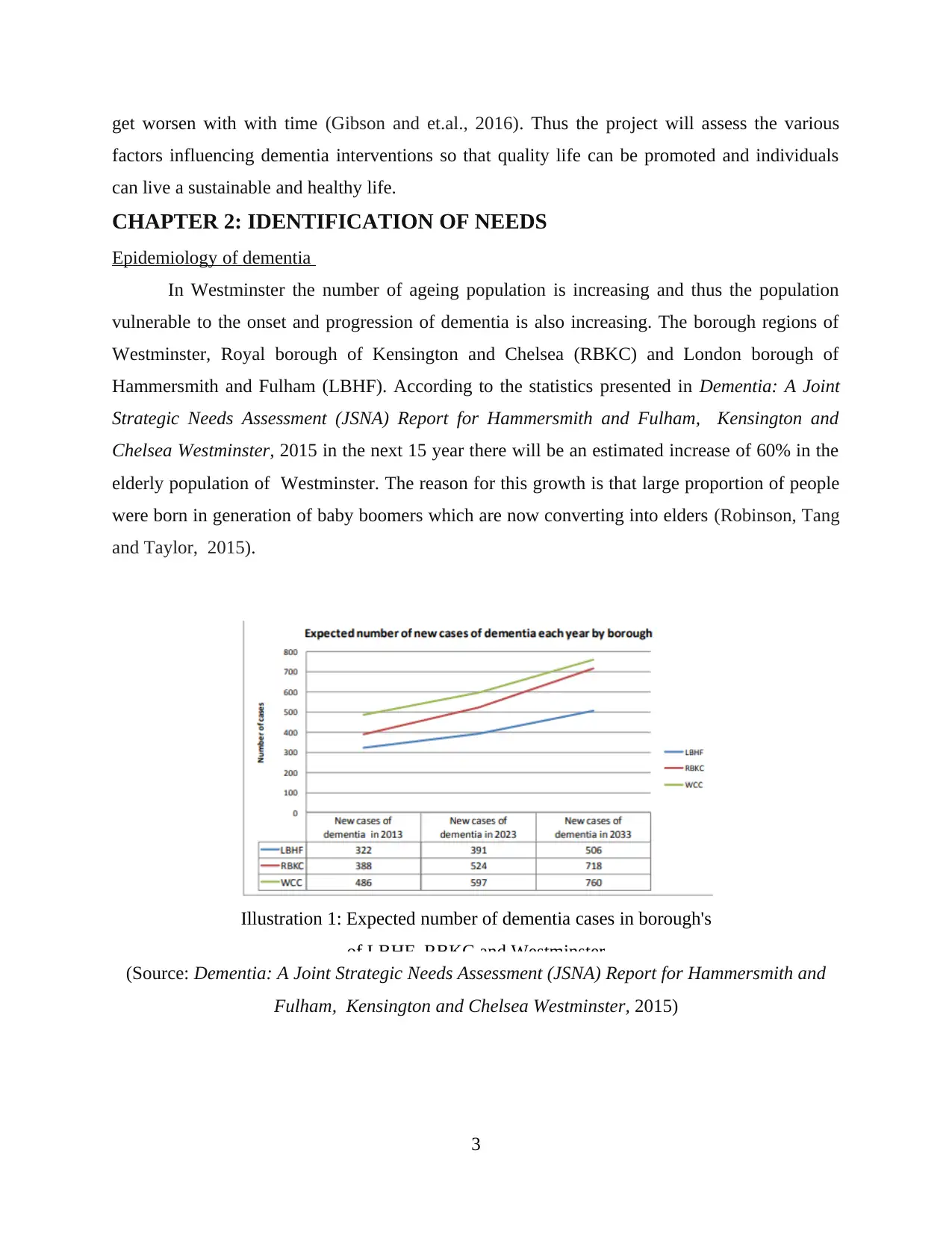
get worsen with with time (Gibson and et.al., 2016). Thus the project will assess the various
factors influencing dementia interventions so that quality life can be promoted and individuals
can live a sustainable and healthy life.
CHAPTER 2: IDENTIFICATION OF NEEDS
Epidemiology of dementia
In Westminster the number of ageing population is increasing and thus the population
vulnerable to the onset and progression of dementia is also increasing. The borough regions of
Westminster, Royal borough of Kensington and Chelsea (RBKC) and London borough of
Hammersmith and Fulham (LBHF). According to the statistics presented in Dementia: A Joint
Strategic Needs Assessment (JSNA) Report for Hammersmith and Fulham, Kensington and
Chelsea Westminster, 2015 in the next 15 year there will be an estimated increase of 60% in the
elderly population of Westminster. The reason for this growth is that large proportion of people
were born in generation of baby boomers which are now converting into elders (Robinson, Tang
and Taylor, 2015).
(Source: Dementia: A Joint Strategic Needs Assessment (JSNA) Report for Hammersmith and
Fulham, Kensington and Chelsea Westminster, 2015)
3
Illustration 1: Expected number of dementia cases in borough's
of LBHF, RBKC and Westminster
factors influencing dementia interventions so that quality life can be promoted and individuals
can live a sustainable and healthy life.
CHAPTER 2: IDENTIFICATION OF NEEDS
Epidemiology of dementia
In Westminster the number of ageing population is increasing and thus the population
vulnerable to the onset and progression of dementia is also increasing. The borough regions of
Westminster, Royal borough of Kensington and Chelsea (RBKC) and London borough of
Hammersmith and Fulham (LBHF). According to the statistics presented in Dementia: A Joint
Strategic Needs Assessment (JSNA) Report for Hammersmith and Fulham, Kensington and
Chelsea Westminster, 2015 in the next 15 year there will be an estimated increase of 60% in the
elderly population of Westminster. The reason for this growth is that large proportion of people
were born in generation of baby boomers which are now converting into elders (Robinson, Tang
and Taylor, 2015).
(Source: Dementia: A Joint Strategic Needs Assessment (JSNA) Report for Hammersmith and
Fulham, Kensington and Chelsea Westminster, 2015)
3
Illustration 1: Expected number of dementia cases in borough's
of LBHF, RBKC and Westminster
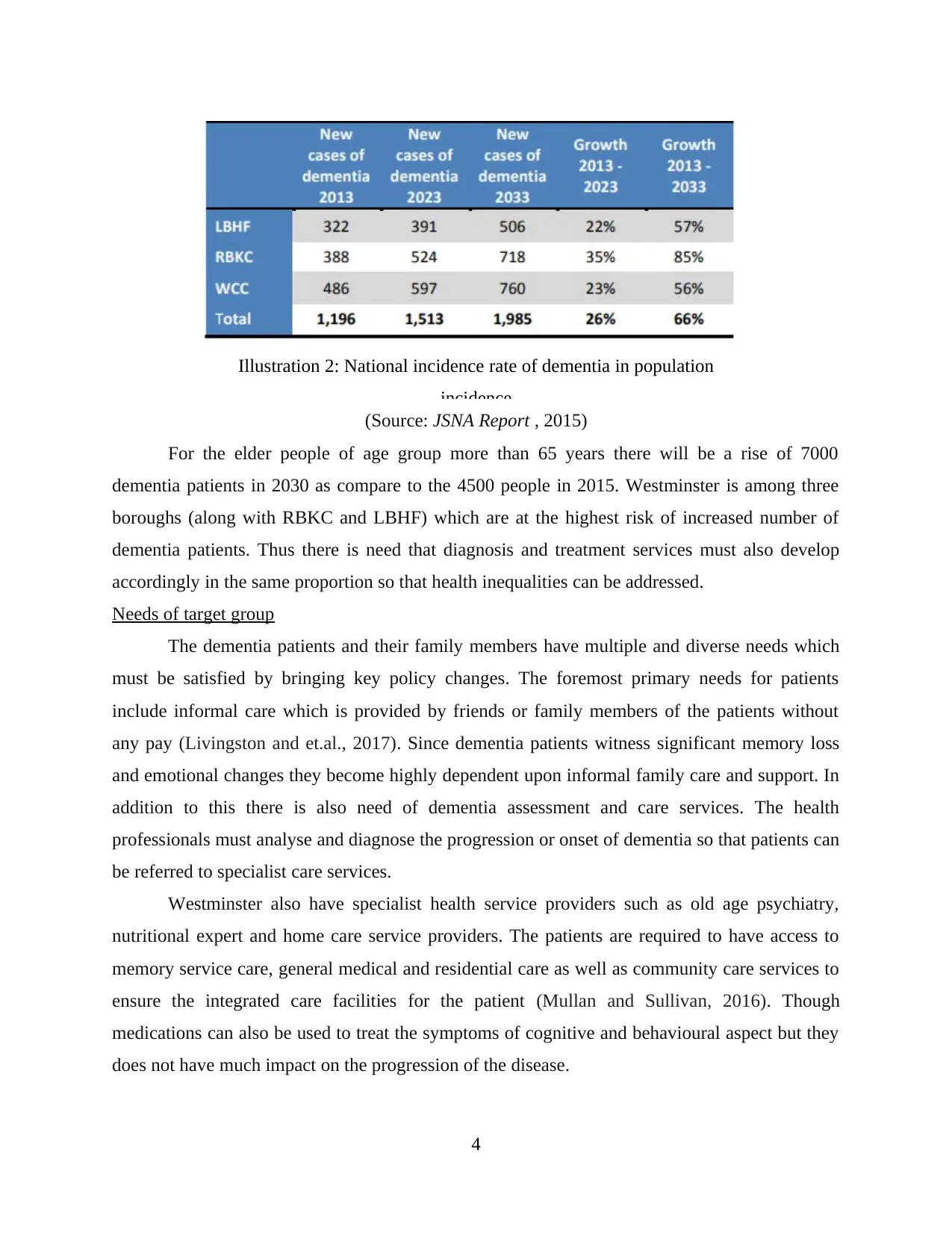
(Source: JSNA Report , 2015)
For the elder people of age group more than 65 years there will be a rise of 7000
dementia patients in 2030 as compare to the 4500 people in 2015. Westminster is among three
boroughs (along with RBKC and LBHF) which are at the highest risk of increased number of
dementia patients. Thus there is need that diagnosis and treatment services must also develop
accordingly in the same proportion so that health inequalities can be addressed.
Needs of target group
The dementia patients and their family members have multiple and diverse needs which
must be satisfied by bringing key policy changes. The foremost primary needs for patients
include informal care which is provided by friends or family members of the patients without
any pay (Livingston and et.al., 2017). Since dementia patients witness significant memory loss
and emotional changes they become highly dependent upon informal family care and support. In
addition to this there is also need of dementia assessment and care services. The health
professionals must analyse and diagnose the progression or onset of dementia so that patients can
be referred to specialist care services.
Westminster also have specialist health service providers such as old age psychiatry,
nutritional expert and home care service providers. The patients are required to have access to
memory service care, general medical and residential care as well as community care services to
ensure the integrated care facilities for the patient (Mullan and Sullivan, 2016). Though
medications can also be used to treat the symptoms of cognitive and behavioural aspect but they
does not have much impact on the progression of the disease.
4
Illustration 2: National incidence rate of dementia in population
incidence
For the elder people of age group more than 65 years there will be a rise of 7000
dementia patients in 2030 as compare to the 4500 people in 2015. Westminster is among three
boroughs (along with RBKC and LBHF) which are at the highest risk of increased number of
dementia patients. Thus there is need that diagnosis and treatment services must also develop
accordingly in the same proportion so that health inequalities can be addressed.
Needs of target group
The dementia patients and their family members have multiple and diverse needs which
must be satisfied by bringing key policy changes. The foremost primary needs for patients
include informal care which is provided by friends or family members of the patients without
any pay (Livingston and et.al., 2017). Since dementia patients witness significant memory loss
and emotional changes they become highly dependent upon informal family care and support. In
addition to this there is also need of dementia assessment and care services. The health
professionals must analyse and diagnose the progression or onset of dementia so that patients can
be referred to specialist care services.
Westminster also have specialist health service providers such as old age psychiatry,
nutritional expert and home care service providers. The patients are required to have access to
memory service care, general medical and residential care as well as community care services to
ensure the integrated care facilities for the patient (Mullan and Sullivan, 2016). Though
medications can also be used to treat the symptoms of cognitive and behavioural aspect but they
does not have much impact on the progression of the disease.
4
Illustration 2: National incidence rate of dementia in population
incidence
⊘ This is a preview!⊘
Do you want full access?
Subscribe today to unlock all pages.

Trusted by 1+ million students worldwide
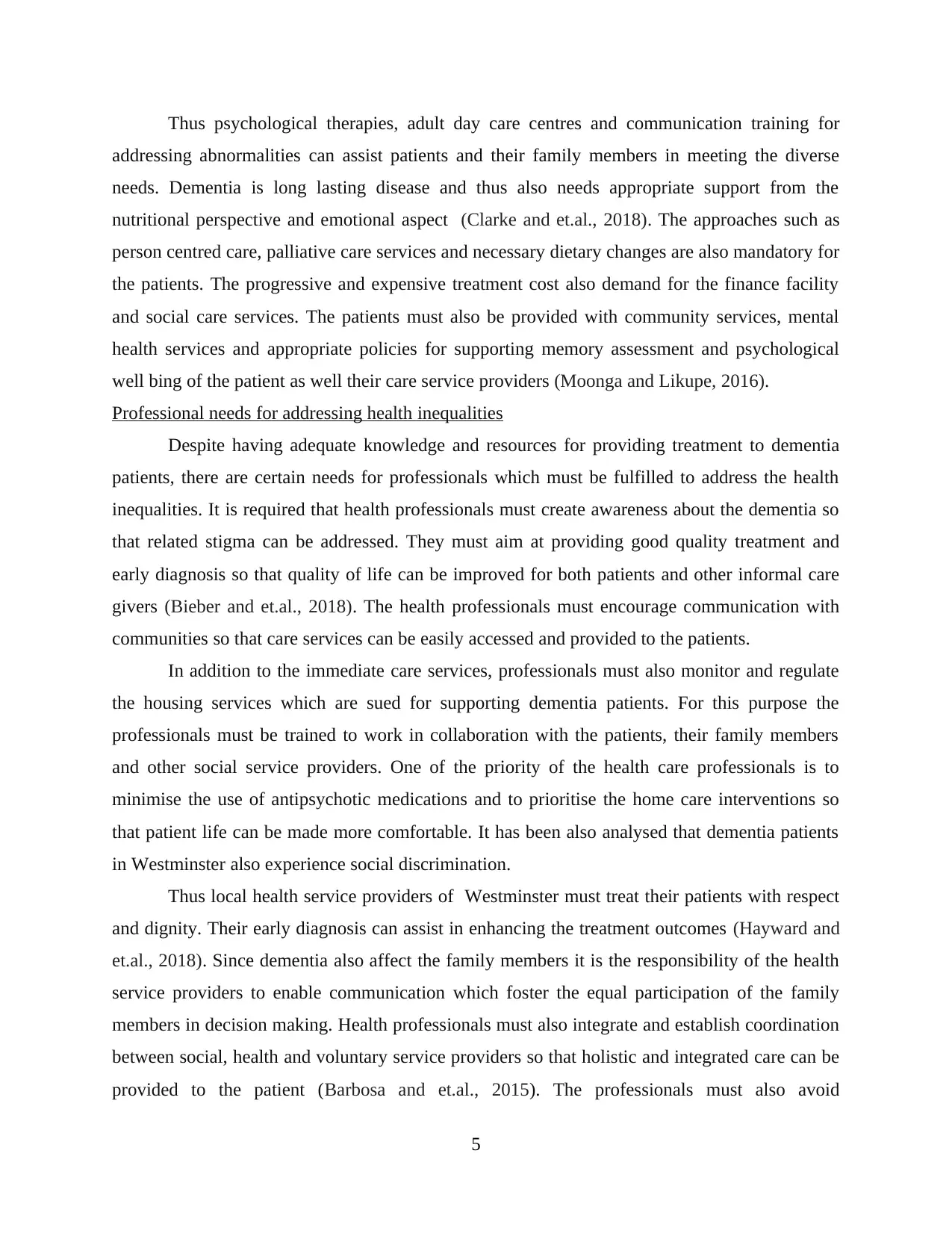
Thus psychological therapies, adult day care centres and communication training for
addressing abnormalities can assist patients and their family members in meeting the diverse
needs. Dementia is long lasting disease and thus also needs appropriate support from the
nutritional perspective and emotional aspect (Clarke and et.al., 2018). The approaches such as
person centred care, palliative care services and necessary dietary changes are also mandatory for
the patients. The progressive and expensive treatment cost also demand for the finance facility
and social care services. The patients must also be provided with community services, mental
health services and appropriate policies for supporting memory assessment and psychological
well bing of the patient as well their care service providers (Moonga and Likupe, 2016).
Professional needs for addressing health inequalities
Despite having adequate knowledge and resources for providing treatment to dementia
patients, there are certain needs for professionals which must be fulfilled to address the health
inequalities. It is required that health professionals must create awareness about the dementia so
that related stigma can be addressed. They must aim at providing good quality treatment and
early diagnosis so that quality of life can be improved for both patients and other informal care
givers (Bieber and et.al., 2018). The health professionals must encourage communication with
communities so that care services can be easily accessed and provided to the patients.
In addition to the immediate care services, professionals must also monitor and regulate
the housing services which are sued for supporting dementia patients. For this purpose the
professionals must be trained to work in collaboration with the patients, their family members
and other social service providers. One of the priority of the health care professionals is to
minimise the use of antipsychotic medications and to prioritise the home care interventions so
that patient life can be made more comfortable. It has been also analysed that dementia patients
in Westminster also experience social discrimination.
Thus local health service providers of Westminster must treat their patients with respect
and dignity. Their early diagnosis can assist in enhancing the treatment outcomes (Hayward and
et.al., 2018). Since dementia also affect the family members it is the responsibility of the health
service providers to enable communication which foster the equal participation of the family
members in decision making. Health professionals must also integrate and establish coordination
between social, health and voluntary service providers so that holistic and integrated care can be
provided to the patient (Barbosa and et.al., 2015). The professionals must also avoid
5
addressing abnormalities can assist patients and their family members in meeting the diverse
needs. Dementia is long lasting disease and thus also needs appropriate support from the
nutritional perspective and emotional aspect (Clarke and et.al., 2018). The approaches such as
person centred care, palliative care services and necessary dietary changes are also mandatory for
the patients. The progressive and expensive treatment cost also demand for the finance facility
and social care services. The patients must also be provided with community services, mental
health services and appropriate policies for supporting memory assessment and psychological
well bing of the patient as well their care service providers (Moonga and Likupe, 2016).
Professional needs for addressing health inequalities
Despite having adequate knowledge and resources for providing treatment to dementia
patients, there are certain needs for professionals which must be fulfilled to address the health
inequalities. It is required that health professionals must create awareness about the dementia so
that related stigma can be addressed. They must aim at providing good quality treatment and
early diagnosis so that quality of life can be improved for both patients and other informal care
givers (Bieber and et.al., 2018). The health professionals must encourage communication with
communities so that care services can be easily accessed and provided to the patients.
In addition to the immediate care services, professionals must also monitor and regulate
the housing services which are sued for supporting dementia patients. For this purpose the
professionals must be trained to work in collaboration with the patients, their family members
and other social service providers. One of the priority of the health care professionals is to
minimise the use of antipsychotic medications and to prioritise the home care interventions so
that patient life can be made more comfortable. It has been also analysed that dementia patients
in Westminster also experience social discrimination.
Thus local health service providers of Westminster must treat their patients with respect
and dignity. Their early diagnosis can assist in enhancing the treatment outcomes (Hayward and
et.al., 2018). Since dementia also affect the family members it is the responsibility of the health
service providers to enable communication which foster the equal participation of the family
members in decision making. Health professionals must also integrate and establish coordination
between social, health and voluntary service providers so that holistic and integrated care can be
provided to the patient (Barbosa and et.al., 2015). The professionals must also avoid
5
Paraphrase This Document
Need a fresh take? Get an instant paraphrase of this document with our AI Paraphraser
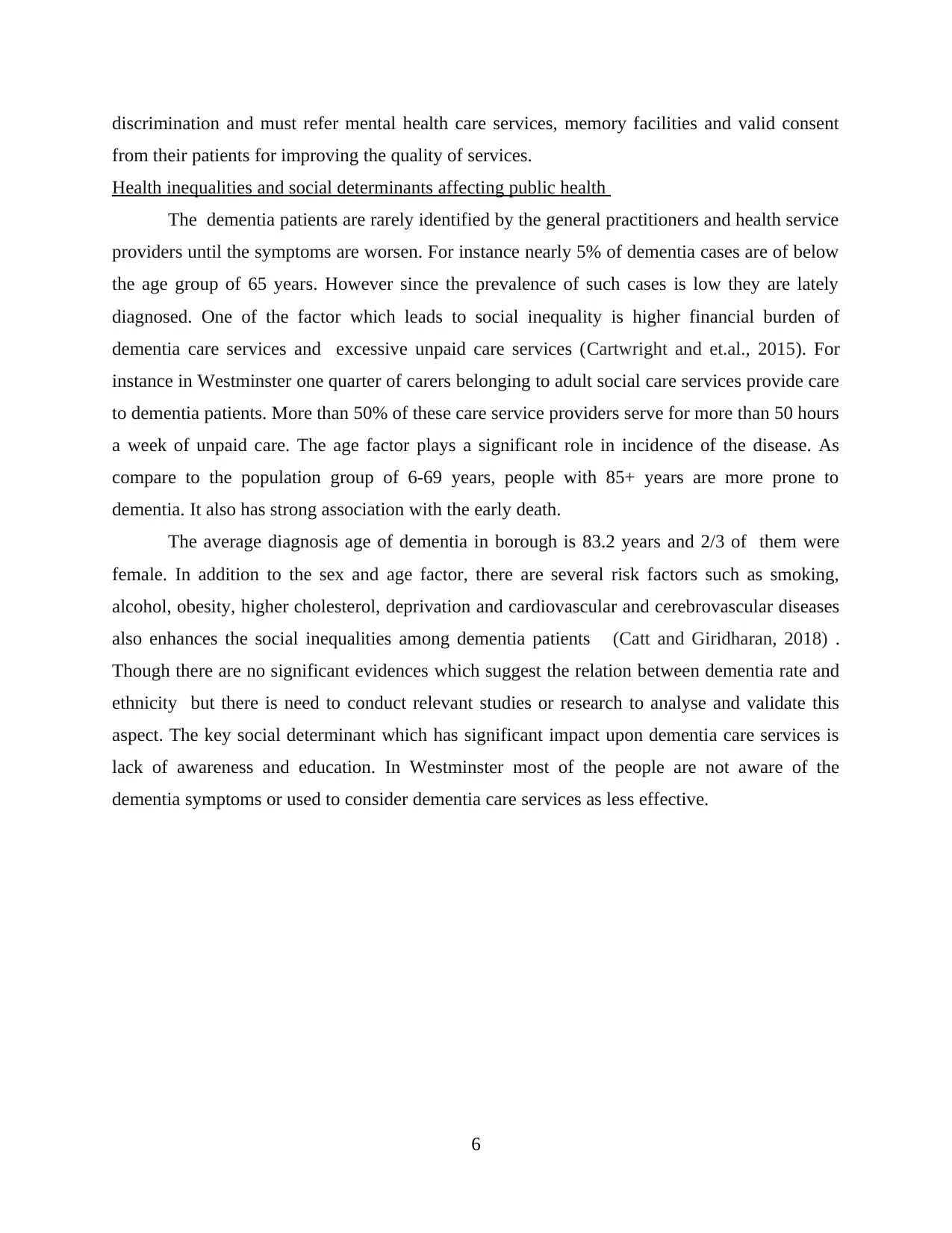
discrimination and must refer mental health care services, memory facilities and valid consent
from their patients for improving the quality of services.
Health inequalities and social determinants affecting public health
The dementia patients are rarely identified by the general practitioners and health service
providers until the symptoms are worsen. For instance nearly 5% of dementia cases are of below
the age group of 65 years. However since the prevalence of such cases is low they are lately
diagnosed. One of the factor which leads to social inequality is higher financial burden of
dementia care services and excessive unpaid care services (Cartwright and et.al., 2015). For
instance in Westminster one quarter of carers belonging to adult social care services provide care
to dementia patients. More than 50% of these care service providers serve for more than 50 hours
a week of unpaid care. The age factor plays a significant role in incidence of the disease. As
compare to the population group of 6-69 years, people with 85+ years are more prone to
dementia. It also has strong association with the early death.
The average diagnosis age of dementia in borough is 83.2 years and 2/3 of them were
female. In addition to the sex and age factor, there are several risk factors such as smoking,
alcohol, obesity, higher cholesterol, deprivation and cardiovascular and cerebrovascular diseases
also enhances the social inequalities among dementia patients (Catt and Giridharan, 2018) .
Though there are no significant evidences which suggest the relation between dementia rate and
ethnicity but there is need to conduct relevant studies or research to analyse and validate this
aspect. The key social determinant which has significant impact upon dementia care services is
lack of awareness and education. In Westminster most of the people are not aware of the
dementia symptoms or used to consider dementia care services as less effective.
6
from their patients for improving the quality of services.
Health inequalities and social determinants affecting public health
The dementia patients are rarely identified by the general practitioners and health service
providers until the symptoms are worsen. For instance nearly 5% of dementia cases are of below
the age group of 65 years. However since the prevalence of such cases is low they are lately
diagnosed. One of the factor which leads to social inequality is higher financial burden of
dementia care services and excessive unpaid care services (Cartwright and et.al., 2015). For
instance in Westminster one quarter of carers belonging to adult social care services provide care
to dementia patients. More than 50% of these care service providers serve for more than 50 hours
a week of unpaid care. The age factor plays a significant role in incidence of the disease. As
compare to the population group of 6-69 years, people with 85+ years are more prone to
dementia. It also has strong association with the early death.
The average diagnosis age of dementia in borough is 83.2 years and 2/3 of them were
female. In addition to the sex and age factor, there are several risk factors such as smoking,
alcohol, obesity, higher cholesterol, deprivation and cardiovascular and cerebrovascular diseases
also enhances the social inequalities among dementia patients (Catt and Giridharan, 2018) .
Though there are no significant evidences which suggest the relation between dementia rate and
ethnicity but there is need to conduct relevant studies or research to analyse and validate this
aspect. The key social determinant which has significant impact upon dementia care services is
lack of awareness and education. In Westminster most of the people are not aware of the
dementia symptoms or used to consider dementia care services as less effective.
6
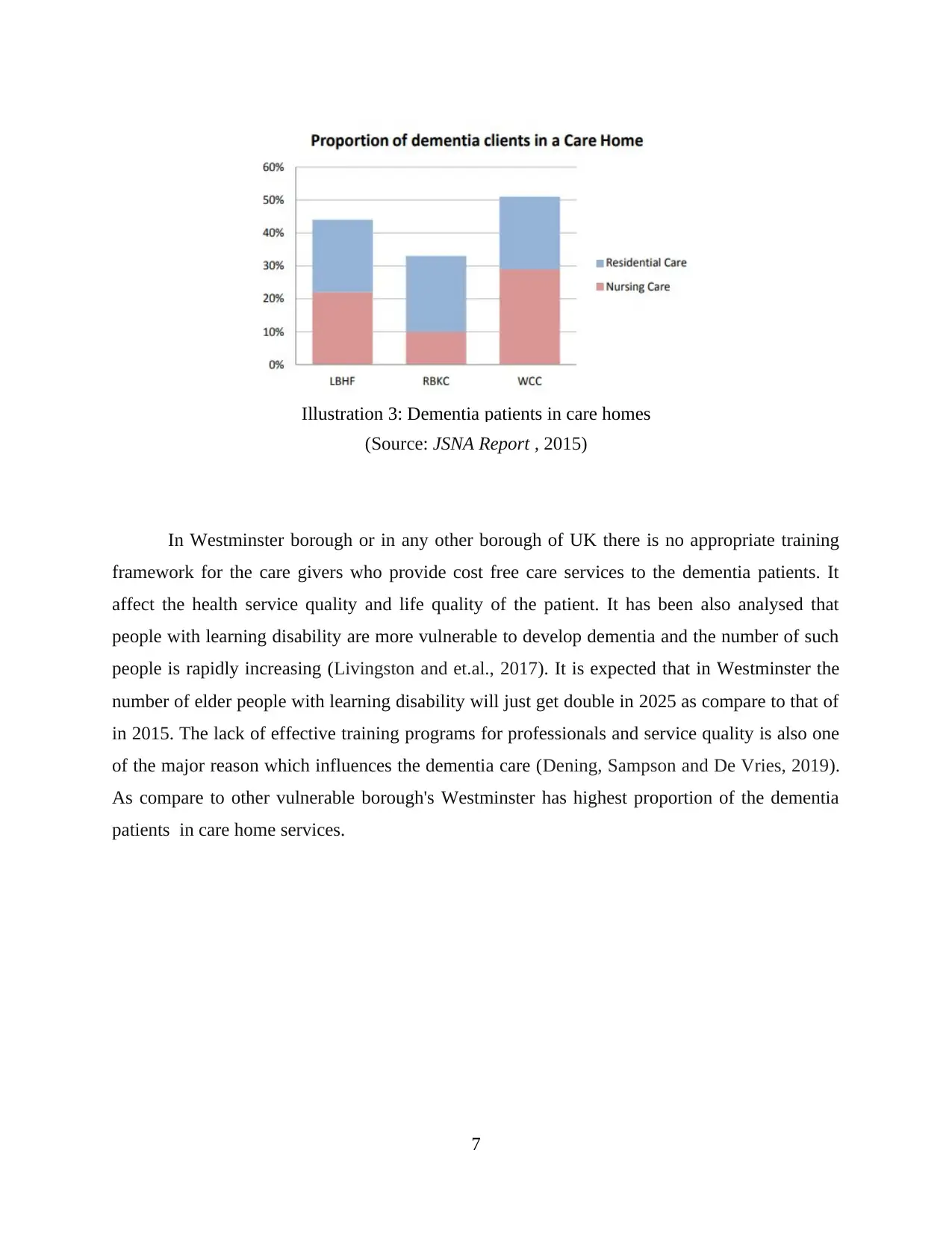
(Source: JSNA Report , 2015)
In Westminster borough or in any other borough of UK there is no appropriate training
framework for the care givers who provide cost free care services to the dementia patients. It
affect the health service quality and life quality of the patient. It has been also analysed that
people with learning disability are more vulnerable to develop dementia and the number of such
people is rapidly increasing (Livingston and et.al., 2017). It is expected that in Westminster the
number of elder people with learning disability will just get double in 2025 as compare to that of
in 2015. The lack of effective training programs for professionals and service quality is also one
of the major reason which influences the dementia care (Dening, Sampson and De Vries, 2019).
As compare to other vulnerable borough's Westminster has highest proportion of the dementia
patients in care home services.
7
Illustration 3: Dementia patients in care homes
In Westminster borough or in any other borough of UK there is no appropriate training
framework for the care givers who provide cost free care services to the dementia patients. It
affect the health service quality and life quality of the patient. It has been also analysed that
people with learning disability are more vulnerable to develop dementia and the number of such
people is rapidly increasing (Livingston and et.al., 2017). It is expected that in Westminster the
number of elder people with learning disability will just get double in 2025 as compare to that of
in 2015. The lack of effective training programs for professionals and service quality is also one
of the major reason which influences the dementia care (Dening, Sampson and De Vries, 2019).
As compare to other vulnerable borough's Westminster has highest proportion of the dementia
patients in care home services.
7
Illustration 3: Dementia patients in care homes
⊘ This is a preview!⊘
Do you want full access?
Subscribe today to unlock all pages.

Trusted by 1+ million students worldwide
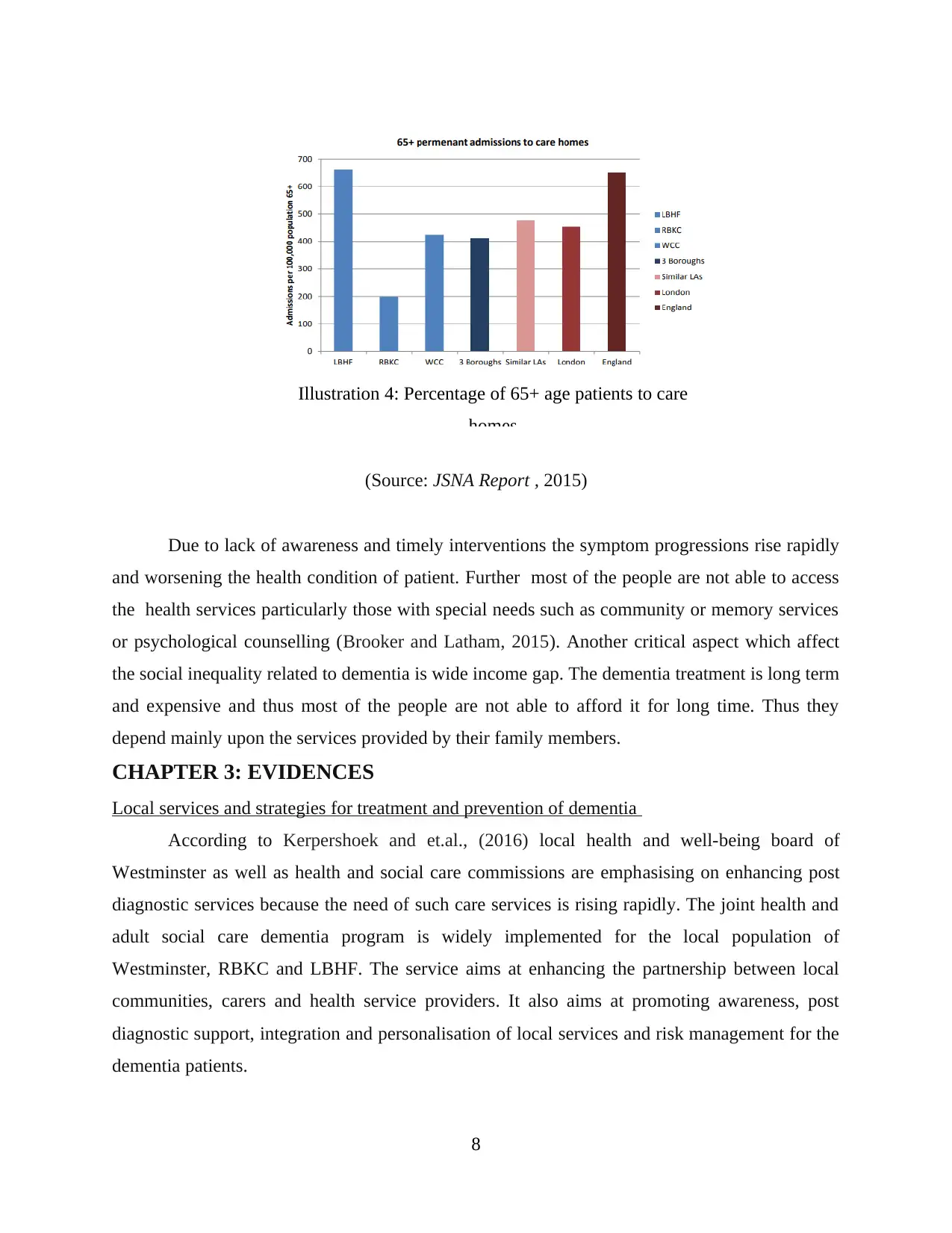
(Source: JSNA Report , 2015)
Due to lack of awareness and timely interventions the symptom progressions rise rapidly
and worsening the health condition of patient. Further most of the people are not able to access
the health services particularly those with special needs such as community or memory services
or psychological counselling (Brooker and Latham, 2015). Another critical aspect which affect
the social inequality related to dementia is wide income gap. The dementia treatment is long term
and expensive and thus most of the people are not able to afford it for long time. Thus they
depend mainly upon the services provided by their family members.
CHAPTER 3: EVIDENCES
Local services and strategies for treatment and prevention of dementia
According to Kerpershoek and et.al., (2016) local health and well-being board of
Westminster as well as health and social care commissions are emphasising on enhancing post
diagnostic services because the need of such care services is rising rapidly. The joint health and
adult social care dementia program is widely implemented for the local population of
Westminster, RBKC and LBHF. The service aims at enhancing the partnership between local
communities, carers and health service providers. It also aims at promoting awareness, post
diagnostic support, integration and personalisation of local services and risk management for the
dementia patients.
8
Illustration 4: Percentage of 65+ age patients to care
homes
Due to lack of awareness and timely interventions the symptom progressions rise rapidly
and worsening the health condition of patient. Further most of the people are not able to access
the health services particularly those with special needs such as community or memory services
or psychological counselling (Brooker and Latham, 2015). Another critical aspect which affect
the social inequality related to dementia is wide income gap. The dementia treatment is long term
and expensive and thus most of the people are not able to afford it for long time. Thus they
depend mainly upon the services provided by their family members.
CHAPTER 3: EVIDENCES
Local services and strategies for treatment and prevention of dementia
According to Kerpershoek and et.al., (2016) local health and well-being board of
Westminster as well as health and social care commissions are emphasising on enhancing post
diagnostic services because the need of such care services is rising rapidly. The joint health and
adult social care dementia program is widely implemented for the local population of
Westminster, RBKC and LBHF. The service aims at enhancing the partnership between local
communities, carers and health service providers. It also aims at promoting awareness, post
diagnostic support, integration and personalisation of local services and risk management for the
dementia patients.
8
Illustration 4: Percentage of 65+ age patients to care
homes
Paraphrase This Document
Need a fresh take? Get an instant paraphrase of this document with our AI Paraphraser
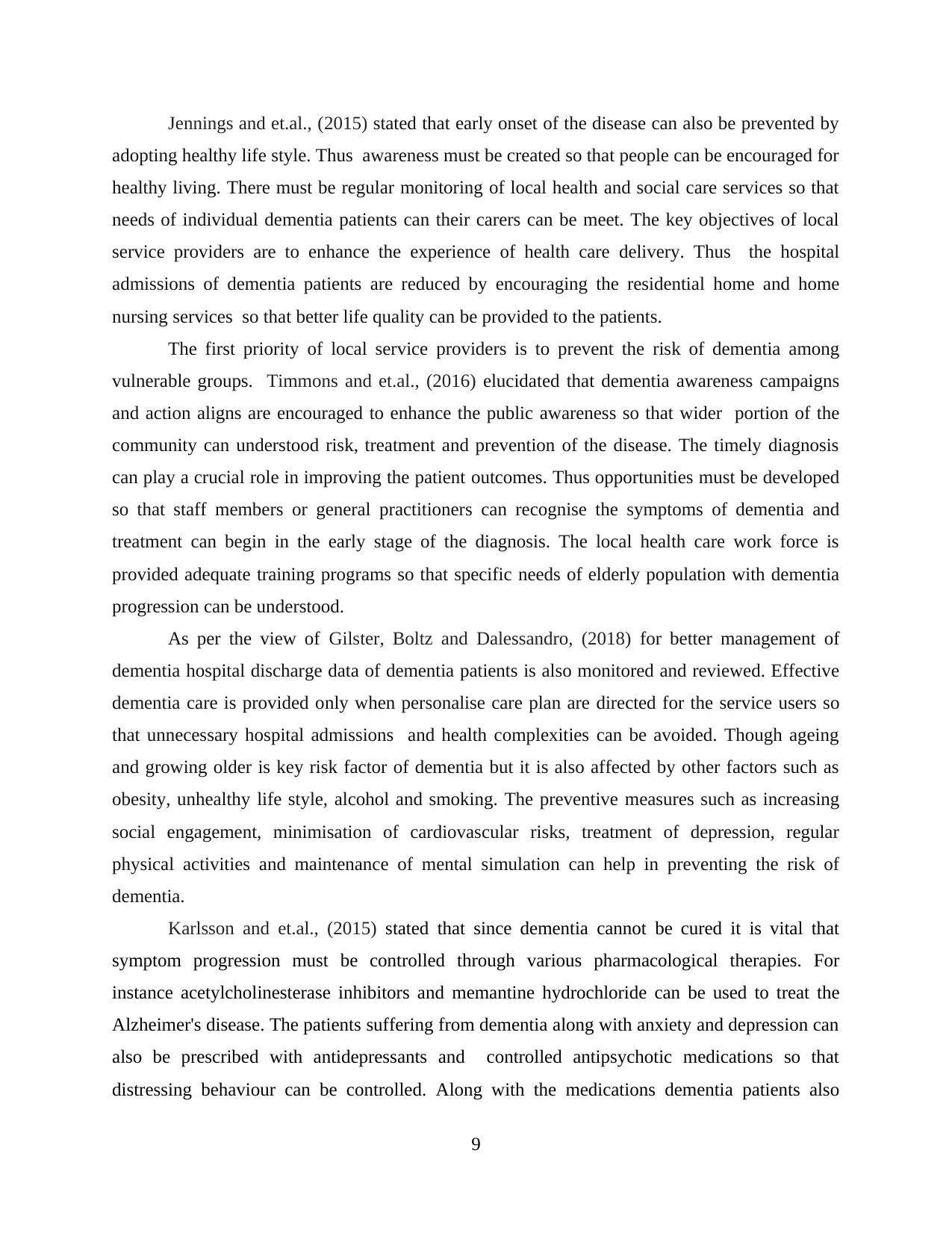
Jennings and et.al., (2015) stated that early onset of the disease can also be prevented by
adopting healthy life style. Thus awareness must be created so that people can be encouraged for
healthy living. There must be regular monitoring of local health and social care services so that
needs of individual dementia patients can their carers can be meet. The key objectives of local
service providers are to enhance the experience of health care delivery. Thus the hospital
admissions of dementia patients are reduced by encouraging the residential home and home
nursing services so that better life quality can be provided to the patients.
The first priority of local service providers is to prevent the risk of dementia among
vulnerable groups. Timmons and et.al., (2016) elucidated that dementia awareness campaigns
and action aligns are encouraged to enhance the public awareness so that wider portion of the
community can understood risk, treatment and prevention of the disease. The timely diagnosis
can play a crucial role in improving the patient outcomes. Thus opportunities must be developed
so that staff members or general practitioners can recognise the symptoms of dementia and
treatment can begin in the early stage of the diagnosis. The local health care work force is
provided adequate training programs so that specific needs of elderly population with dementia
progression can be understood.
As per the view of Gilster, Boltz and Dalessandro, (2018) for better management of
dementia hospital discharge data of dementia patients is also monitored and reviewed. Effective
dementia care is provided only when personalise care plan are directed for the service users so
that unnecessary hospital admissions and health complexities can be avoided. Though ageing
and growing older is key risk factor of dementia but it is also affected by other factors such as
obesity, unhealthy life style, alcohol and smoking. The preventive measures such as increasing
social engagement, minimisation of cardiovascular risks, treatment of depression, regular
physical activities and maintenance of mental simulation can help in preventing the risk of
dementia.
Karlsson and et.al., (2015) stated that since dementia cannot be cured it is vital that
symptom progression must be controlled through various pharmacological therapies. For
instance acetylcholinesterase inhibitors and memantine hydrochloride can be used to treat the
Alzheimer's disease. The patients suffering from dementia along with anxiety and depression can
also be prescribed with antidepressants and controlled antipsychotic medications so that
distressing behaviour can be controlled. Along with the medications dementia patients also
9
adopting healthy life style. Thus awareness must be created so that people can be encouraged for
healthy living. There must be regular monitoring of local health and social care services so that
needs of individual dementia patients can their carers can be meet. The key objectives of local
service providers are to enhance the experience of health care delivery. Thus the hospital
admissions of dementia patients are reduced by encouraging the residential home and home
nursing services so that better life quality can be provided to the patients.
The first priority of local service providers is to prevent the risk of dementia among
vulnerable groups. Timmons and et.al., (2016) elucidated that dementia awareness campaigns
and action aligns are encouraged to enhance the public awareness so that wider portion of the
community can understood risk, treatment and prevention of the disease. The timely diagnosis
can play a crucial role in improving the patient outcomes. Thus opportunities must be developed
so that staff members or general practitioners can recognise the symptoms of dementia and
treatment can begin in the early stage of the diagnosis. The local health care work force is
provided adequate training programs so that specific needs of elderly population with dementia
progression can be understood.
As per the view of Gilster, Boltz and Dalessandro, (2018) for better management of
dementia hospital discharge data of dementia patients is also monitored and reviewed. Effective
dementia care is provided only when personalise care plan are directed for the service users so
that unnecessary hospital admissions and health complexities can be avoided. Though ageing
and growing older is key risk factor of dementia but it is also affected by other factors such as
obesity, unhealthy life style, alcohol and smoking. The preventive measures such as increasing
social engagement, minimisation of cardiovascular risks, treatment of depression, regular
physical activities and maintenance of mental simulation can help in preventing the risk of
dementia.
Karlsson and et.al., (2015) stated that since dementia cannot be cured it is vital that
symptom progression must be controlled through various pharmacological therapies. For
instance acetylcholinesterase inhibitors and memantine hydrochloride can be used to treat the
Alzheimer's disease. The patients suffering from dementia along with anxiety and depression can
also be prescribed with antidepressants and controlled antipsychotic medications so that
distressing behaviour can be controlled. Along with the medications dementia patients also
9
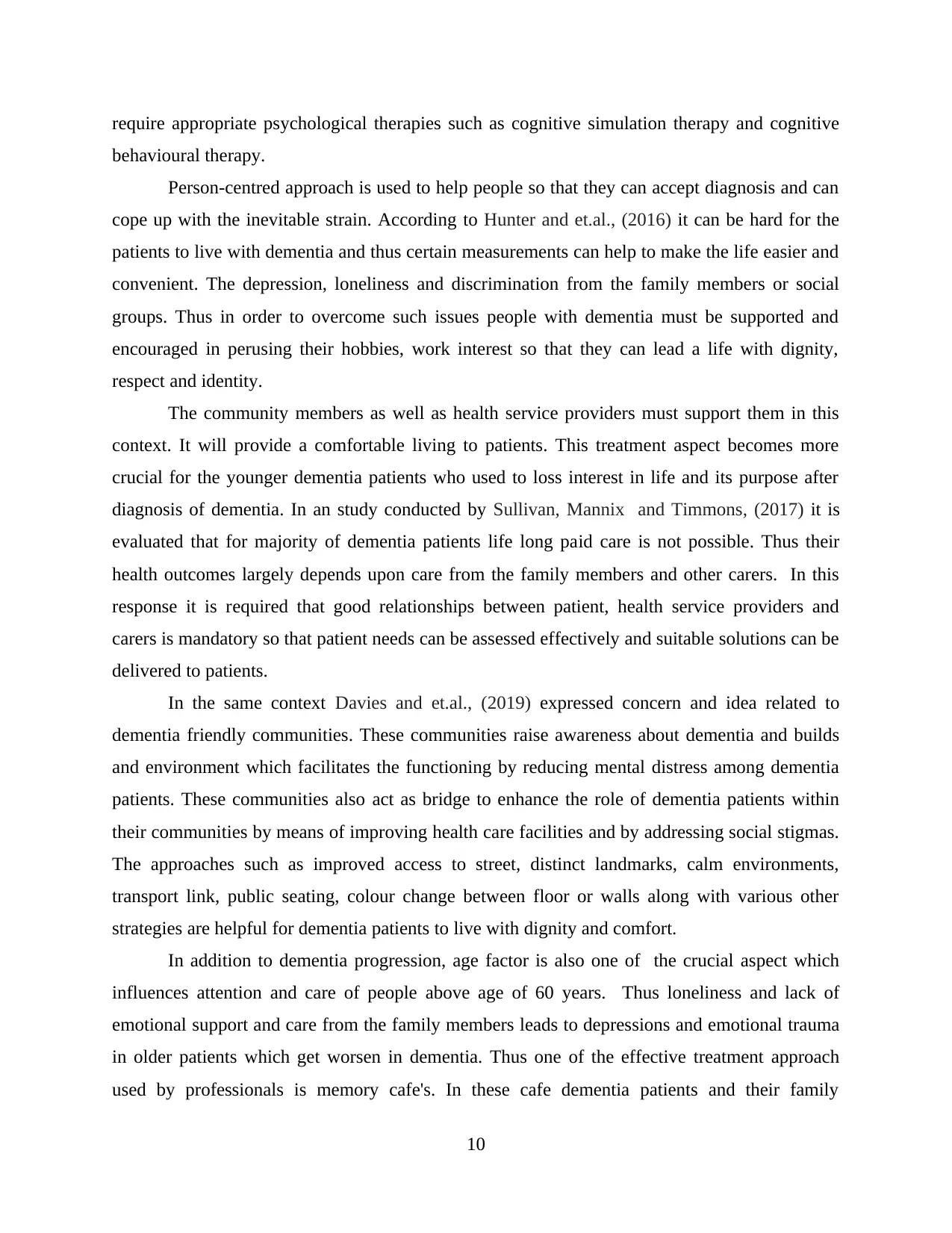
require appropriate psychological therapies such as cognitive simulation therapy and cognitive
behavioural therapy.
Person-centred approach is used to help people so that they can accept diagnosis and can
cope up with the inevitable strain. According to Hunter and et.al., (2016) it can be hard for the
patients to live with dementia and thus certain measurements can help to make the life easier and
convenient. The depression, loneliness and discrimination from the family members or social
groups. Thus in order to overcome such issues people with dementia must be supported and
encouraged in perusing their hobbies, work interest so that they can lead a life with dignity,
respect and identity.
The community members as well as health service providers must support them in this
context. It will provide a comfortable living to patients. This treatment aspect becomes more
crucial for the younger dementia patients who used to loss interest in life and its purpose after
diagnosis of dementia. In an study conducted by Sullivan, Mannix and Timmons, (2017) it is
evaluated that for majority of dementia patients life long paid care is not possible. Thus their
health outcomes largely depends upon care from the family members and other carers. In this
response it is required that good relationships between patient, health service providers and
carers is mandatory so that patient needs can be assessed effectively and suitable solutions can be
delivered to patients.
In the same context Davies and et.al., (2019) expressed concern and idea related to
dementia friendly communities. These communities raise awareness about dementia and builds
and environment which facilitates the functioning by reducing mental distress among dementia
patients. These communities also act as bridge to enhance the role of dementia patients within
their communities by means of improving health care facilities and by addressing social stigmas.
The approaches such as improved access to street, distinct landmarks, calm environments,
transport link, public seating, colour change between floor or walls along with various other
strategies are helpful for dementia patients to live with dignity and comfort.
In addition to dementia progression, age factor is also one of the crucial aspect which
influences attention and care of people above age of 60 years. Thus loneliness and lack of
emotional support and care from the family members leads to depressions and emotional trauma
in older patients which get worsen in dementia. Thus one of the effective treatment approach
used by professionals is memory cafe's. In these cafe dementia patients and their family
10
behavioural therapy.
Person-centred approach is used to help people so that they can accept diagnosis and can
cope up with the inevitable strain. According to Hunter and et.al., (2016) it can be hard for the
patients to live with dementia and thus certain measurements can help to make the life easier and
convenient. The depression, loneliness and discrimination from the family members or social
groups. Thus in order to overcome such issues people with dementia must be supported and
encouraged in perusing their hobbies, work interest so that they can lead a life with dignity,
respect and identity.
The community members as well as health service providers must support them in this
context. It will provide a comfortable living to patients. This treatment aspect becomes more
crucial for the younger dementia patients who used to loss interest in life and its purpose after
diagnosis of dementia. In an study conducted by Sullivan, Mannix and Timmons, (2017) it is
evaluated that for majority of dementia patients life long paid care is not possible. Thus their
health outcomes largely depends upon care from the family members and other carers. In this
response it is required that good relationships between patient, health service providers and
carers is mandatory so that patient needs can be assessed effectively and suitable solutions can be
delivered to patients.
In the same context Davies and et.al., (2019) expressed concern and idea related to
dementia friendly communities. These communities raise awareness about dementia and builds
and environment which facilitates the functioning by reducing mental distress among dementia
patients. These communities also act as bridge to enhance the role of dementia patients within
their communities by means of improving health care facilities and by addressing social stigmas.
The approaches such as improved access to street, distinct landmarks, calm environments,
transport link, public seating, colour change between floor or walls along with various other
strategies are helpful for dementia patients to live with dignity and comfort.
In addition to dementia progression, age factor is also one of the crucial aspect which
influences attention and care of people above age of 60 years. Thus loneliness and lack of
emotional support and care from the family members leads to depressions and emotional trauma
in older patients which get worsen in dementia. Thus one of the effective treatment approach
used by professionals is memory cafe's. In these cafe dementia patients and their family
10
⊘ This is a preview!⊘
Do you want full access?
Subscribe today to unlock all pages.

Trusted by 1+ million students worldwide
1 out of 24
Related Documents
Your All-in-One AI-Powered Toolkit for Academic Success.
+13062052269
info@desklib.com
Available 24*7 on WhatsApp / Email
![[object Object]](/_next/static/media/star-bottom.7253800d.svg)
Unlock your academic potential
Copyright © 2020–2026 A2Z Services. All Rights Reserved. Developed and managed by ZUCOL.





